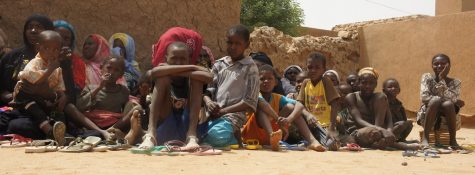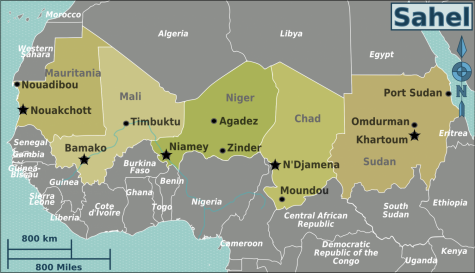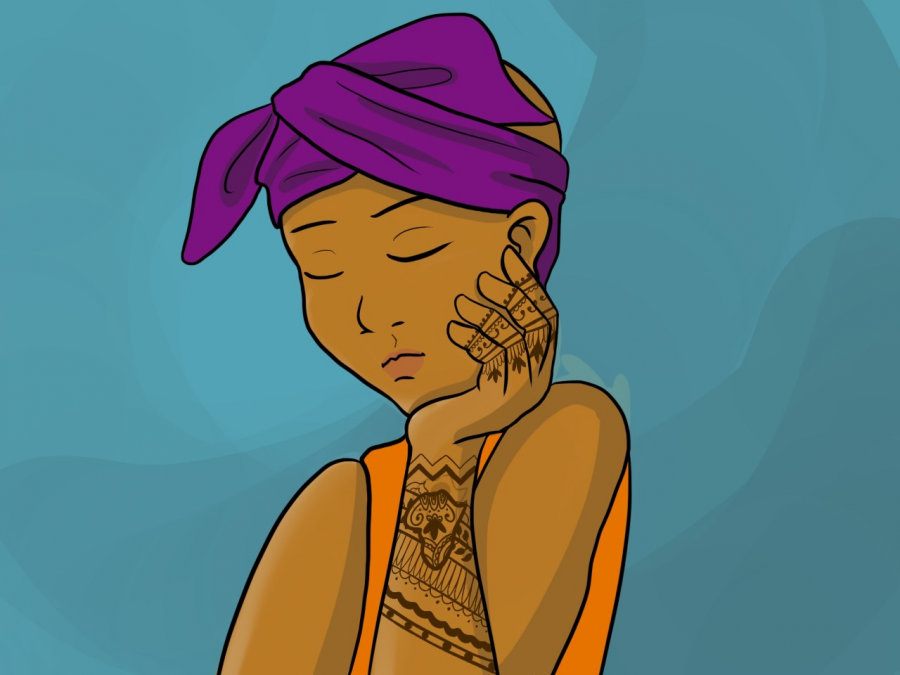Climate change is a fight for gender equality
College of DuPage’s Girl Up club will host Henna for Mali on Thursday, Oct. 17. All proceeds from giving students henna tattoos will be donated to the Heroic Hearts Organization’s programs for women, children and orphans in Mali, Africa (graphic by Jessica Tapia)
October 5, 2019
Climate change is a battle for empowerment.
Whose voices will be heard and whose livelihoods will be taken away?
Sixteen-year-old Greta Thunberg raised her voice to tell world leaders at the United Nations Climate Action Summit, “How dare you continue to look away and come here saying you’re doing enough, when the politics and solutions needed are still nowhere in sight.”
Climate change disproportionately affects the poorest regions already facing limited resources. Women, who are tasked as homemakers, and their children, are especially impacted by destabilizing conflict. The U.N. reported 80% of those displaced by climate change are women.
Poonam Rahman is a College of DuPage student who was inspired to help create the school’s Girl Up club by the lack of educational opportunities for girls in her parents’ home country of Bangladesh. Girl Up is an international organization founded by the U.N. to promote gender equality and empowerment through activism.
“I felt like I needed to make a stand and help girls all over the world,” said Rahman. “In this day and age, girls need to be independent, and education is what will allow them to do so. Empowerment means becoming stronger and more confident. (We will have) gender equality when all genders have the same rights and benefits.”

Displaced women and children fleeing conflict in northern Mali. 87,000 people have been displaced in 2019. In the nation’s rapidly changing and resource deficient north, 30 percent of children face stunted growth due to malnutrition and the absence of proper medical care (photo by: flickr Cyprien Fabre)
COD’s Girl Up will host Henna for Mali on Thursday, Oct. 17. All proceeds from giving students henna tattoos will be donated to the Heroic Hearts Organization’s programs for women, children and orphans in Mali.
Mali, and the entire Sahel region of Saharan Africa, is seen as the forefront of how a changing climate affects the planet’s poorest inhabitants. The Sahel faces heat waves, severe droughts and floods, soil erosion, deforestation and a desert encroaching further into herder’s grazing lands every year. According to the U.N., 24 million people across the Sahel require humanitarian assistance, with 4.7 million children under the age of five suffering from acute malnutrition.
The competition for increasingly limited resources has exacerbated pre-existing ethnic tensions and minorities’ feelings of political disenfranchisement. Sowing the seeds for extremism and militancy, over 11,500 people have been murdered in militant attacks over the past four years, as reported by the BBC.
Sara Hassan is the vice president and co-founder of the Heroic Hearts Organization. The Wheaton-based nonprofit provides aid to developing nations like Syria, Mali, Palestine and Bangladesh. She said women and children are always the worst affected by displacement and conflict.

“A lot of women have lost their husbands and family members to war, conflict and tragic circumstances,” said Hassan. “In the regions we work in, women are traditionally the homemakers. When a spouse is lost, it’s difficult for these women to transition into being a sole financial-provider. Organizations like ours allow them to find security and receive the aid they need to survive.”
The charity primarily focuses on orphan sponsorship, where donors can ensure an individual child is provided for. Working with different organizations in Mali enables them to access orphanages and villages and determine specific needs like education, food, shelter and clothing. Donors can follow the growth of their sponsor child.
One project funds water wells to address the difficulty finding clean and reliable water in Mali. Donors can track how many villagers use the well they helped construct. Another project helps provide agricultural tools needed to sustain farming.
“In pairing education with life-skills programs, we involve women and girls so they learn how to provide and adapt to more than just household tasks,” said Hassan. “We want to begin building training centers in secure areas for women so they can gain the educational skills they need to create their own paths for themselves and their families. In these regions it can be dangerous for girls just to travel to school.”
Rahman said Girl Up chose to help Mali because the struggles of women and children in the nation often go unnoticed by the general public.
“For young women in Mali, empowerment means education,” said Rahman. “Young women are married and bear children at a young age. Education allows them to delay marriage and pursue their dreams of building a career.”
Rahman said every societal difference that can be made in regions like Mali begins with providing gender equality through accessible and quality education.
This is why environmental activists have claimed the fight against climate change is part of the struggle for female empowerment.
Peter Maurer, president of the International Committee of the Red Cross told the BBC, “We often look at armed actors, and maybe at underdevelopment, but now we see climate change is leading to conflicts among communities and this is a different kind of violence.”
Depleted resources and conflict have resulted in an exodus of mass displacement and migration. The flow of people from regions like the Sahel and Syria, have inflamed xenophobia, protectionism and nationalism in the nations migrants seek refuge. This reactionary intolerance only serves to multiply economic and gender inequality.
Hassan said anti-immigrant sentiment is ironic given the first-world’s contributions to feeding the displacement.
“It’s frustrating when people like (President Donald) Trump advocate against immigrants while failing to understand we are part of the problem.” said Hassan. “Through arm sales and our international policies, we often directly fund instability in these regions.”
Hassan said migrants wouldn’t need to risk dying crossing the Mediterranean if governments would address the use of resources in a sustainable and equitable manner. She sees the education of women as always being imperiled until stabilization isn’t politicized and used as a weapon against its own people.
“In Syria, aid like food, clean water and medicine from large organizations is blocked from communities as a military strategy,” said Hassan. “These trapped people are being bombed and shelled almost daily. Because we are smaller and have local volunteers on the ground, we can sneak past border guards under the radar. Our volunteers can get the needed resources into places other charities cannot.”
In Mali, extremists linked to al-Qaeda have offered nomadic Tuareg secessionist rebels of the north the guise of security and political self-determination. The nation’s uranium and gold resources have been extracted by those in power without equal compensation amongst ethnic groups.
Hassan said inequality is structured to maximize political power and wealth. This ultimately results in tribalism.
“When people feel they are not receiving support from the government, they splinter into different sects,” said Hassan. “The sects promote their own ideologies and fracture the community. In Syria, splinter groups often use ideology to get exposure resulting in militancy.”
Hassan said the way to combat this fragmentation of society is by increasing representation and forming more inclusive governments. She pointed to the disparity between women and men in the U.S. Congress as an example of the difficulties women face in inspiring equality on a political level.
She said girls should be inspired to become socially active at an early age.
“Young girls have developed tunnel-vision on things that only affect their own lives,” said Hassan. “It’s crucial to gain exposure to these things happening around the world. I plan on getting my daughters involved and volunteering at an early age. College students can help with things like our yearly winter clothing drive for people in Syria.”
She said having children changed how she sees the plights of the most vulnerable around the world.
“When I see the suffering children I think that could have been my child,” said Hassan. “I don’t know why I was lucky to be born in a land of privilege. Exposure to their suffering makes your empathy grow. That’s why I began this work. I wanted to figure out what these girls need to help themselves and have the same ambitions I’ve had. Empowerment to me has always meant having the ability to help other women.”
Hassan said community support from organizations like Girl Up is crucial to ensure charities like Heroic Hearts impact the most lives.
Rahman stressed Girl Up is an all-inclusive club open to students of any gender, race and age.
“It doesn’t matter who you are or where you are from, there are lots of opportunities and benefits for students,” said Rahman. “Young women, regardless of their age, (always) have the potential to make an impact and inspire change in the world.”
TO PROVIDE AID OR VOLUNTEER VISIT:
– hchearts.org (Heroic Hearts Organization)




















